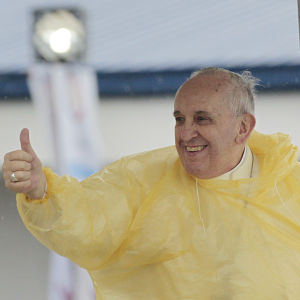Pope Francis is one of the world’s most respected individuals. His spiritual values, humility and concern for those who are less well off are qualities to be emulated. Nonetheless, when he goes beyond his sphere of knowledge, he can be just as fallible as the rest of us. That fallibility has been displayed whenever he has ventured into climate change.
He recently met with a small group of oil executives, almost all of whom have embraced the climate orthodoxy that human activities, namely using fossil fuels, are causing a global climate crisis. He urged swift action to save the environment and the planet by shifting away from fossil fuels. His call to these executives was “to be the core of a group of leaders who envision the global energy transition in a way that will take into account all the peoples of the earth, as well as future generations and all species and ecosystems.”
Those who share the pope’s views believe that human-caused climate change is resulting in increased droughts, hurricanes, heat waves and sea-level rise. This requires a large leap of faith about our state of knowledge on the accuracy of historical reconstructions and the accuracy of computer models.
Climatologist Roger Pielke, testified before Congress that there exists little scientific support for claims that hurricanes, tornadoes, floods and drought have increased in frequency or intensity. This conclusion is consistent with the view of the National Climate Data Center, which has stated: “Weather and climate extremes have been varying and changing on many different time scales. … While this is in keeping with expectations in a warming climate, it turns out that decadal variations in the number of U.S. heat and cold waves do not correlate well with the observed U.S. warming during the last century.”
Why is this the case? According to a National Geographic article, “The current instrumental record is reliable for only about 60 years, which is too short to determine, for example, whether the observed increase in hurricane activity since the mid-1990s is part of a natural cycle or due to human activity.”
Papers from the NOAA Geophysical Lab conclude that “it is likely that the increase in Atlantic tropical storm and hurricane frequency… since the late-1800s is primarily due to improved monitoring.
In short, data records are a mess. There are no long-term consistent records. Instead, there is a patchwork of compilations from different and evolving technologies that vary in precision. This leads to a temperature record built on assumptions that in turn lead to assumptions about what climate conditions existed that produced that data. This helps to explain why climate model results that advocates rely on do such a poor job in predicting and replicating past climates.
In promoting rapid decarbonization, Pope Francis has ignored the tremendous human benefits that have been the result of fossil fuel use coupled with human ingenuity. He also, surprisingly, ignores the billion or so people who live in the worst state of poverty because they lack access to commercial energy.
The Catholic Church teaches that the pope is infallible when speaking about faith and morals. On other matters, his views are no better or worse than anyone else’s who has taken time to study climate change. In the words of the late Daniel Patrick Moynihan, we are all entitled to our own opinions but not our own facts. The facts do not support Pope Francis’ view or his instructions to oil company CEOs.

